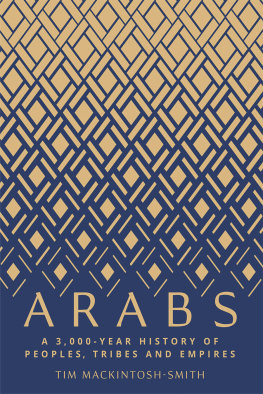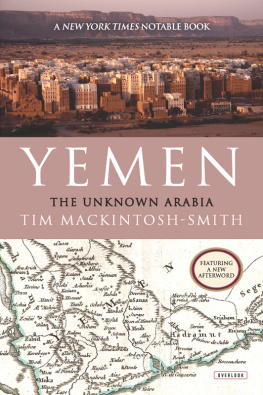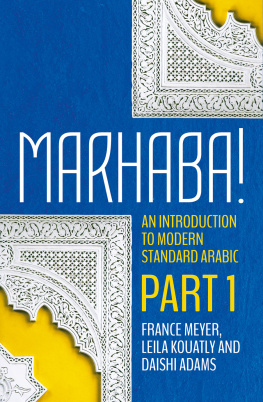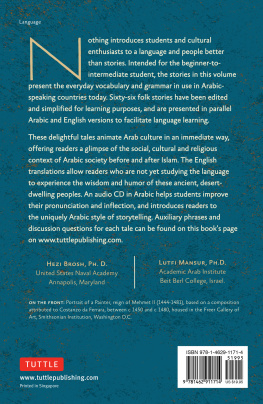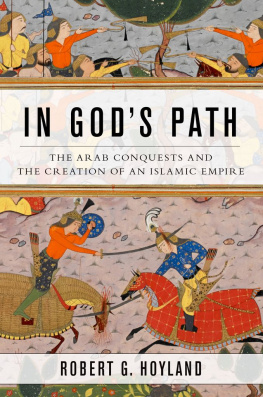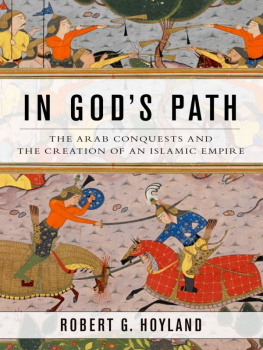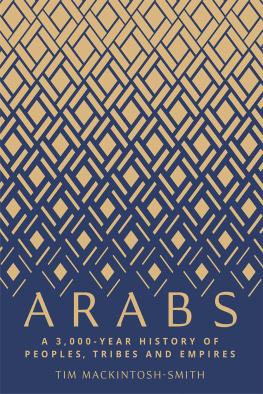ARABS
OTHER WORKS BY THE AUTHOR
Travel/History
Yemen: Travels in Dictionary Land (1997)
Travels with a Tangerine: A Journey in the Footnotes of Ibn Battutah (2001)
The Hall of a Thousand Columns: Hindustan to Malabar with Ibn Battutah (2005)
Landfalls: On the Edge of Islam with Ibn Battutah (2010)
Editions/Translations
The Travels of Ibn Battutah (2002)
Two Arabic Travel Books (with James E. Montgomery; 2014)
Kitab al-Ifadah (Abd al-Latif al-Baghdadis description of Egypt; forthcoming)
Fiction
Bloodstone (2017)

Copyright 2019 Tim Mackintosh-Smith
All rights reserved. This book may not be reproduced in whole or in part, in any form (beyond that copying permitted by Sections 107 and 108 of the U.S. Copyright Law and except by reviewers for the public press) without written permission from the publishers.
For information about this and other Yale University Press publications, please contact:
U.S. Office:
Europe Office:
Set in Fournier MT by IDSUK (DataConnection) Ltd
Printed in Great Britain by Gomer Press Ltd, Llandysul, Ceredigion, Wales
Library of Congress Control Number: 2018968579
ISBN 978-0-300-18028-2
A catalogue record for this book is available from the British Library.
10 9 8 7 6 5 4 3 2 1
Shab:... Collection, or union; and also separation, division, or disunion... A nation, people, race, or family of mankind...
Edward William Lane, An Arabic-English Lexicon
And if your Lord had so willed, He could surely have made mankind one community. But they will not cease to disagree.
Quran 11:118
Thus we had upwards of 1,400 separate tribal governments in the two [Hadhrami] states. There were also several hundred autonomous towns of unarmed men... Altogether I calculated there were about 2,000 separate governments in the Hadhramaut.
Harold Ingrams, Arabia and the Isles
In memory of a unified Yemen (19902014)
and of Ali Husayn Ashab (19982016)
and all the others who died with it.

CONTENTS

ILLUSTRATIONS
AND MAPS
ILLUSTRATIONS
MAPS
FOREWORD

THE WHEEL AND THE HOURGLASS

I did not think that time would ever wear out what was new,
or that its changes would divide a people who were one.
Dhu l-Rummah
Twenty-seven years ago I began work on my first book, an exploration of the land and history of Yemen, the country in which I was living, and where I still live now. The two former parts of the country had been unified not long before, in May 1990, just ahead of German unification. Walls were coming down, iron curtains parting, and a line in the wilderness was being erased. In Yemen, it was a time of optimism. Admittedly, there was a short war of attempted secession in 1994, in which the former regime in the south shot almost as many Scud missiles at us in Sana as Saddam Husayn had launched at Israel three years earlier; in response, our rulers in the north inflicted a horde of straggle-bearded islamists on Aden who trashed, inter alia, the only brewery in Arabia. But the unified Yemen survived. Bygones, it seemed, became bygones.
That first book of mine was a homage to a land that had held on to much from its past, to its millennial cultural unity. Between the lines, the book was also homage to its renewed political unity. Yemen had been a unified state in earlier periods: in pre-Islamic times, briefly in the fourteenth century, briefly again in the seventeenth. To many Yemenis, as to me, that unity seemed, still seems, to be somehow right and proper, something natural. It seemed right at least as long ago as the fourteenth century: If Yemen were to be united under one ruler, wrote an observer in Egypt, its importance would increase and its position among the eminent nations would be strengthened.
In fact, for more than nine-tenths of its known history, Yemen has not been unified; far from it. Now, as I write, it appears to be falling apart again. So too, seemingly, are Iraq and Libya; Syria may hold together, just, under brute force; Egypts integrity looks safe, but its society is deeply riven. These five countries contain half the population of the Arabic-speaking world. According to a recent United Nations report, that world is home to 5 per cent of humanity, but generates 58 per cent of the earths refugees and 68 per cent of its battle-related deaths... Sometimes it seems that only one thing unites Arabs, and that is their inability to get along with each other. Why this disunity? Why this extraordinary level of self-harm?
The absence of democracy and its institutions, Westerners (shorthand but useful) would say. They may have a point; but recent foreign interventions allegedly aiming to promote democracy appear only to have added to the mayhem. And when there are free and fair elections, the islamists tend to win them; the elections are annulled in a military coup, and the Westerners go strangely silent. Mouths and money do not go together, it seems.
The failure of Islam to unify itself, the islamists (again, shorthand) would say. But that unity has itself been a mirage almost from the Islamic year dot. Battles over authority and legitimacy have been fought within the community of Muslims, with words and other weapons, since the fourth decade of the Islamic era.
The legacy of imperialism, Arab nationalists (there are still a few left) would say. But nearly every attempt at unity in the post-imperial age has failed, usually because of inter-Arab suspicions and squabbles. One Arab commentator, in a post-mortem on the 1948 Arab-Israeli war, wrote that The Arabs would have won the battle for Palestine had there not been something false and rotten in themselves. That something was mutual distrust, resentment and fear. It was the rottenness of bad blood, and it has bubbled up time and again through Arab history.
Of course, disunity is hardly an Arab monopoly. Much of the map of Europe was a crazy paving of statelets well into the modern age. That German reunification of 1990, itself part of a contrary process that fragmented the Soviet Union, was a return to a unity that was then a mere two lifetimes old. During those lifetimes, Europe had been the epicentre of wars that blasted apart the Ottoman and Austro-Hungarian empires and led to the gentler meltdown of the British empire but out of which came the United Nations and the European Union (those well-known bastions of unanimity). All the worlds a crucible in which once-stable compounds are continually breaking down and new ones forming. If there were no such change, there would be no history. Union and division are part of the same process. Hence the first epigraph to this book, from Lanes Arabic-English Lexicon:
Shab:... Collection, or union; and also separation, division, or disunion... A nation, people, race, or family of mankind...
(Things become slightly clearer when we see how this apparent contradiction in terms works: as well as a people and all these other things, a
Next page
